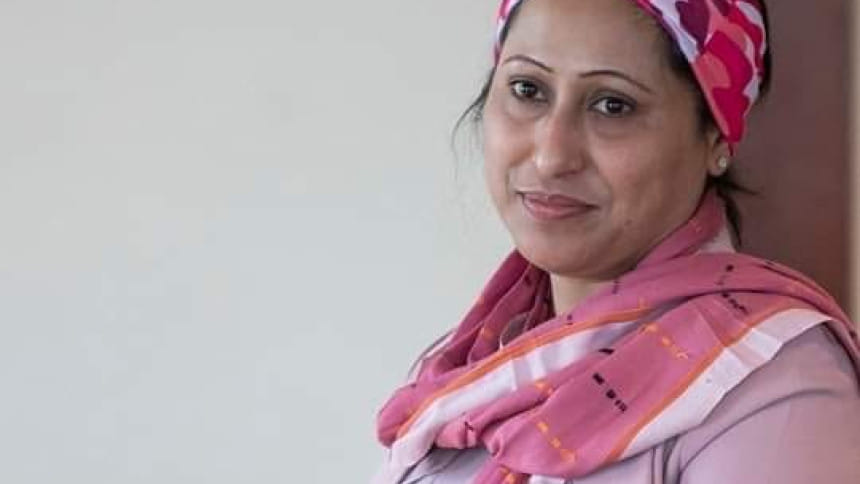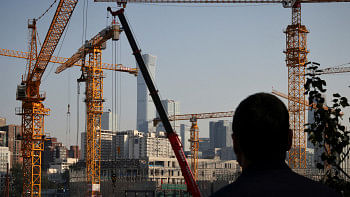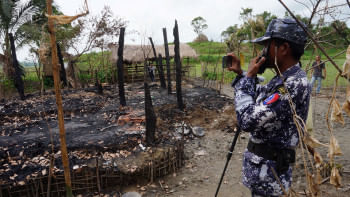‘Rohingya refugees need education to take control of their future’

Razia Sultana, lawyer and Rohingya human rights activist, talks about camp conditions, repatriation and the future of Rohingya youth in an interview with Shuprova Tasneem of The Daily Star.
In 2017, Myanmar military operations against the Rohingya community led to the largest movement of refugees into Bangladesh. What changes have you seen in the refugee camps since then?
The single biggest issue now is freedom of movement. You need to make applications even to visit your own mother's shelter in another block. This inability to move around inside the camp, even if there is an emergency, affects every facet of life, leading to our greatest problem: A lack of education for Rohingya youth and children.
There used to be over 3,500 learning centres that Rohingya refugees used to run themselves with personal and outside donations. These teachers are now all sitting at home, with no salary and no opportunity to teach. The UNHCR are meant to set up learning centres that will follow the Burmese curriculum to make their learning more systematic, but we have been completely kept in the dark about this. The community has teachers, and has expertise they can share on the curriculum, but they are not being involved. So who is shaping this whole process? And if these unemployed teachers now go ahead and do private tuitions somewhere, will it be a crime, or will it just be a desperate attempt to earn a livelihood and live with a little bit of dignity?
Despite all the proper steps being taken, we are finding it very difficult to get Rohingya teachers, especially women, into jobs in these centres. Without any involvement from our community members and civil society actors, we are afraid that the centres that will be opened will be purely decorative, and Rohingya children will once again face great injustice by being excluded from education. And if they continue to be excluded, then of course they will end up as burdens on the Bangladesh government.

The limits on movement has also led to an end of livelihoods. Whatever little shops that Rohingya refugees had opened have all more or less been shut down. This has led to a food crisis, especially after Covid. All means of income are strictly monitored and have become extremely limited, including working on NGO projects. And then there is security, an issue that we all know about. After 5pm, there are no security forces around, and the camp is completely at the mercy of criminal and militant groups.
There are restrictions of movement, but there is also a huge problem with crime and drug trafficking. This seems counterintuitive.
There is a huge racket passing drugs over the borders and into the camps, but only the small fry are being taken in by the police. The real drug lords who are financing the drug trade are also making millions from it and are not being pursued by law enforcement. We have to ask: given that Rohingya movement is so restricted by security forces, how are traffickers able to move drugs around? It is clear they have support from other vested quarters, without which this would not be possible.
This also applies to trafficking. If there are 10 traffickers' boats from Rakhine state going out, then eight of them are going via Bangladesh and also picking up trafficking victims from the camps. How are they able to move around in Bangladeshi territory like this? Five percent of criminals are holding the entire camps hostage, and no one is being able to do anything about it.
Do you think this has led to stigma against Rohingya refugees?
Almost all media reports on the Rohingya are now negative, and this is having a huge impact on public perception. Recently, I saw a report on Rohingya using fake IDs. Now the people who are doing this are of course guilty of a crime, but they do not have the resources to manufacture such IDs within the camps. So yes, they are buying them, but who is making them? Why are reporters not investigating the entire network of such criminal activities?
Aid has become less than half of what it used to be. Our analysis shows that refugees are now receiving Tk 950 per month per head. Can anyone live on this? Should they choose between food and water? Before, refugees tried to sell their own vegetables or sell some clothes to try and earn a living but that has been shut down. For example, there is a women's market in Kutupalong, where women would sell traditional garments (thami) as well as other clothes. But now, they are allowed to only sell thamis. How many of these do you think one woman can sell? And where will she bring these clothes in from?
If I don't have proper food to eat twice a day, how can I be expected not to steal? If I refuse to give education to the youth, am I not pushing them towards crime? Even when we ask to give training to youth, we are not granted permission to include young men, or we have to jump through many hoops to get it. This sort of harassment is making them fall through the cracks. This situation is also making refugees extremely vulnerable to trafficking. People want to leave for a better life, to survive with dignity.
The word of the day is repatriation. What are your thoughts on this, and do you think the case against Myanmar at the International Court of Justice will have any impact on this?
Whatever that is going on at the international courts is purely symbolic, and their requests that are falling on deaf years. Previously, the National League for Democracy (NLD) in Myanmar had denied all allegations of genocide and dismissed them as lies. And there is no real pressure on Myanmar yet. While ASEAN did exclude Myanmar from a regional summit, this gesture means very little in the absence of strong sanctions.
Every civilian in Myanmar is under threat now, not just Rohingyas, who are not even considered to be a part of the country and denied citizenship. Yet it cannot be denied that every Rohingya refugee in Bangladesh just wants to go home. I also believe they should go back. But the question is: Will they be safe there, when even the citizens who are accepted by Myanmar are now living in fear? Minority communities are in greater danger than ever before.
We are now hearing reports that China has constructed shelters in Rakhine. What are they for? Are we again to have IDP camps for the internally displaced, like the ones that are still there in Sittwe, constructed by the Myanmar authorities to imprison its own people? Yes, there must be repatriation, but it cannot lead to imprisonment, torture and death. They cannot go back to rot in shelters that are basically prisons, or worse, concentration camps.
Are there any other alternatives we should consider?
There is the option of third-country settlement. We have tried many times to advocate for this asylum and involve Rohingya refugees in the process, but it is very difficult. After 2012, some people were taken from registered camps to Canada, but this didn't happen again. There are also Rohingya who live in countries like Malaysia, Australia and the US and want their family members in Bangladeshi camps to join them, but their applications are always stuck at immigration. We should make it easier for refugees to be resettled in this way instead of barring them from leaving.
This resettlement would be especially important for Rohingya youth, who would finally have an opportunity at education. There are a rare few Rohingya women who have had the chance to get higher education, but so far, no young Rohingya men dreaming of college in the camps have managed to get there. I know of certain international universities who have proposed taking such refugee students, but even that has not been allowed to happen.
The fact that donors' attentions have shifted away to other crises, especially in Ukraine, have been a big blow to the Rohingya as well. They are completely abandoned, and perhaps the most marginalised of refugees who are barely getting any crumbs from the donor table. Whenever there is some conflict in the world, the focus moves away from the Rohingya. The US has recognised what happened as genocide, but then what?
In these decision-making circles, there are many people who think none of the Rohingya are educated. I even met a person who didn't know the Rohingya are Muslims. So these people, who carry so much stigma, how can they sit at the table with Myanmar and have fruitful talks? The people who come to these talks need to be aware of the community's history, to work with refugees and not against them, and advise the government properly.
Some people have put Bhashan Char forward as a solution, but that is even more problematic. At the end of the day, it is Bangladeshi land, so why should they be settled there? In my opinion, it sends the wrong message to Myanmar, and puts even less pressure on them. The Rohingya refugees are not people of Bangladesh, so this cannot be a solution for them.
You have painted a very bleak picture. What gives you hope to carry on?
The Rohingya people continue to give me hope. Despite all odds, they believe they can go home one day. "If only I could go home" - I hear this so often, and it just hits you in the heart. They did not come to stay here. This cannot be their life. They live in shelters made with plastic - 10 people living in a space where three cannot live comfortably. One young boy once told me, "Our cow shed back home is bigger than this."
There is still hope, it is not just a dream, because a lot of good people are still working for them. And I hope that the Bangladesh government will also help us to move away from stigma and negative stereotypes surrounding refugees, and recognise their strength and resilience. We have many vocal voices in the camp's civil society, but they need to be given the opportunity to speak.
We have seen in other contexts how education has helped refugees to fight crime and move away from regressive values. We don't know when repatriation will happen, but for now, if we can focus on education, and if we stop looking at Rohingya as burdens and try to build them up as strengths, we can see important change.

 For all latest news, follow The Daily Star's Google News channel.
For all latest news, follow The Daily Star's Google News channel. 







Comments